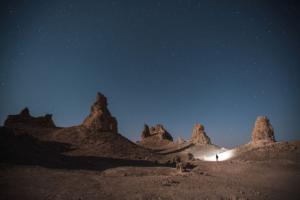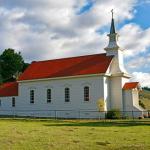
(Afterword from our book, Out into the Desert) – releasing August 15th
It has been a couple years since we wrote the original manuscript for this book. In that short amount of time, things have changed. As we mentioned in the beginning, some of our views have evolved over time. We anticipated this would happen–and it did.
One of the reasons organized religion fails is that it wants to write its dogma and beliefs in stone. We all know from experience that as we grow and as things change, sometimes our beliefs and practices must change as well.
To make a long story short, our concerns about organized religion have only increased. We both feel that we may never go back to attending religious services, especially in American, Evangelical institutions. The feelings we have in this area have only become stronger over the past 2 years.
One of the new arguments we have, here in the desert, is people contending that we need to save the faith. They talk about preserving that faith for their grandchildren. But when we discuss this further, a subtle inconsistency emerges.
We find that what they are really talking about is preserving their religion. We can maintain our faith on an island with no other people. We can hold fast to our beliefs even if we’re the last person on earth.
Many of these people have deconstructed their faith from a conservative, evangelical one to a more Christ-centered, usually more progressive mindset. Then, many of them joined a mainline denomination or transformed their church with great pain to be more orthodox or, as we sometimes say, more “woke.”.
We applaud them for making these changes, especially when it causes them to be more open and affirming to the queer community and more empowering to women. But because they are still doubling down on their religion, what they are protecting are their practices.
We haven’t quite understood that all religious practices are man-made. At some point we invented them, because we thought they would be effective to help us do whatever we thought we should do for God and ourselves. But when these practices have systemic problems because they are part of an organization, we need to solve the inherent problems or we will continue to make the same mistakes, even though we have improved some things.
One of the ways people defend this position is to imply that some people deconstructed too much until nothing was left.
Can we deconstruct too much?
This is, by far, the greatest fear that people have when deconstructing. They wonder whether they will have anything left if they keep asking questions and keep taking down the walls and structures that they have built up over time in their belief system.
In general, people interchange words like faith, Christianity, and beliefs and end up confusing themselves as to exactly what they are evaluating or removing. In this discussion, we wanted to clarify some of those words and how they relate to deconstruction. But first, understand this:
You can’t destroy or deconstruct something that is eternal. If it is real, and/or truth, it can only grow stronger with your honest consideration. To me, it is like a refining.
Christ: For the sake of argument, let’s consider Christ as eternal and something that can’t be diminished. Our faith or allegiance or respect for the eternal Christ should grow stronger with questioning and consideration. As some are prone to imply, maybe we need to take the varnish off the image we had and “restore” a truthful understanding
Religion/Christianity: This is the part that man created and developed over time. Our practices are not sacred, we are simply addicted to them. This is not the part of the equation we need to be doggedly dedicated to.
Faith: this gets equated with religion. My beliefs will change over time, and certainly in deconstruction. I’m allowed to believe what I want and refine those beliefs when I discover the truth; but when I turn it into a creed and make it static, then it just morphs into a religion/system to control others.
Church: the organizational structures we have developed over time are mostly not relevant for the 21st century. The internet has rendered them all but obsolete. Most are plagued with toxicity and produce trauma. They are breeding grounds for political unrest and there are better ways to heal, thrive and grow and we don’t need professional clergy. If, by church, you mean loving your neighbor, then, “yes.”
Otherwise, why don’t we just evolve as people and if we discover we still need religion, we can resurrect it properly.
In my experience, the people that go all the way with deconstruction, usually end up with something more pure and lasting. The things that are real survive, the things that were man-made and superficial, fall away. They find healing and peace and no longer need institutions or belief systems or superficial creedal alliances to the past. They are living present and authentic lives, because they have gone inward instead of looking upward and been able to throw off the baggage involved with man-made systems.
COVID – 19
When we initially wrote this manuscript, the COVID-19 pandemic was just beginning. We were in the early stages of experimenting with not attending religious services. This became almost mandatory for most people when the crisis became more serious. People were actually forced, sometimes by local ordinance, to not attend church.
The more responsible churches were more careful and stopped meeting for longer periods of time, and other pastors and congregations defied advice and braved the pandemic, sometimes with negative consequences.
So, what happened after people stayed away from church for a while? Did they realize they didn’t need it as much as they thought they needed it? Or did it make them long for community and then they grew stronger?
Some of these questions are hard to answer, because the church was already in decline in America, and by 2018, the group known as nones (the unaffiliated), became larger than Evangelicals.
A recent study evaluated church attendance decline after COVID-19. Results showed that church attendance is down somewhere between 6 and 7% from 2019. Underlying reasons and causes of this are probably varied, but my assumption is that people realized in the 21st century that they don’t need it as much as they thought they did.
Of course, these results are not in any way conclusive, but it is in some ways a confirmation of our suspicions.
The depths of our decline.
On January 6th, 2021, Donald J. Trump, our former president, incited a riot that led to an insurrection of our government for the first time in history. He was trying to force his own vice president, Mike Pence, to subvert the will of the people and alter the results of the election.
If successful, one man (the vice president), would have been able to essentially decide who gets elected president of the United States. He refused to do so and the mob, incited by Donald Trump and his allies, moved in on the Capitol, resulting in loss of life, many injuries, and gravely threatened our very democracy.
The troubling part of this scenario is that over 70% of white evangelicals doggedly supported this man and continued to support him through this incident. Politics have become deeply ingrained in the American church and I don’t know that we will be able to surgically remove them.
It is more likely that the Evangelical Church will doggedly hold to their politics, just like they do to their guns until we pull it from their “cold, dead hand.” Occasionally there are signs of hope in these areas, but they are few and far between.
When I was a Southern Baptist, I used to be appalled and upset when I would hear news of how Catholic priests had molested children and covered it up. But recently, I am hearing the same news about my former denomination, the Southern Baptist Convention. The stories of cover up at the highest level and victim shaming make me less and less hopeful that it will ever be resolved.
What is the way forward?
Keith Giles, who wrote the foreword for this book, has just released a book of his own called Sola Mysterium: Celebrating the Beautiful Uncertainty of Everything. In it, he invites us to learn to live with uncertainty as we investigate the mystery of everything.
He challenges us to understand that the opposite of faith is not doubt, it is certainty. Most of our religious problems come when we become certain about what we believe and put up walls and buildings to protect our beliefs, practices, and religion. Many of us have found the glorious delight of living in uncertainty and pursuing the mystery out here in the desert.
We also think it is essential for us to ask better questions.
“The important thing is to never stop questioning.” – Albert Einstein
We Believe a lot differently than we did 10 years ago. When we honestly let ourselves be curious, we found deeper and better answers. Sometimes the answers were very simple, but often they were nuanced and mysterious and complicated. We are so glad we asked those questions. We could have never navigated the stroke recovery with my old understanding.
The key to discovering beauty and truth is to remain curious, not defend what we already know.
We can’t solve the problems and challenges of the 21st century with old ideas. We can’t cling to beliefs and ideas just because the group we are familiar with believes that way.
As the world evolves, our understanding of it has to move with it, or we will find ourselves somewhat irrelevant to the world around us..”
There are no simple, catchphrase answers anymore. Many of these things are complicated and, when we try to oversimplify them, we end up missing the target completely.
Solving big problems is scary, because we have to leave the comfort zone of our answers, and compromise and cooperate with others to find the best solutions. It’s really always been this way, the problems are just different these days.
We are not asking you to give up anything, but question and consider everything, evolve and if your religion survives, then so be it. If it doesn’t survive, then we probably never needed it anyway.
We wish you well on your journey,
Be where you are, be who you are,
Karl and Laura Forehand, 2022
Being: A Journey Toward Presence and Authenticity













